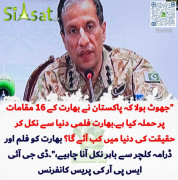And here ladies and gentlemen is another example of the disease that plagues the Pakistani brain - Paranoia of Conspiracy theories. Please observe the subjects closely. They will display a remarkable sense of delusion and are at complete unease within their conspiracy theories. According to some psychologists, a person who believes in one conspiracy theory tends to believe in others; a person who does not believe in one conspiracy theory tends not to believe another.
A study published in 2012 also found that conspiracy theorists frequently believe in multiple conspiracies, even when one conspiracy contradicts the other. For example, the study found that people who believe Osama Bin Laden was captured alive by Americans are also likely to believe that Bin Laden was actually killed prior to the 2011 raid. Humanistic psychologists argue that even if the cabal behind the conspiracy is almost always perceived as hostile, there is often still an element of reassurance in it for conspiracy theorists. This is due, in part, because it is more consoling to think that complications and upheavals in human affairs are created by human beings rather than factors beyond human control. Belief in such a cabal is a device for reassuring oneself that certain occurrences are not random, but ordered by a human intelligence. This renders such occurrences comprehensible and potentially controllable. If a cabal can be implicated in a sequence of events, there is always the hope, however tenuous, of being able to break the cabal's power – or joining it and exercising some of that power oneself. Finally, belief in the power of such a cabal is an implicit assertion of human dignity – an often unconscious but necessary affirmation that man is not totally helpless, but is responsible, at least in some measure, for his own destiny.
In simple words people who believe in conspiracy theories are actually refusing to accept that Human beings are not in control of all events. This gives them some sort of reassurance.

































